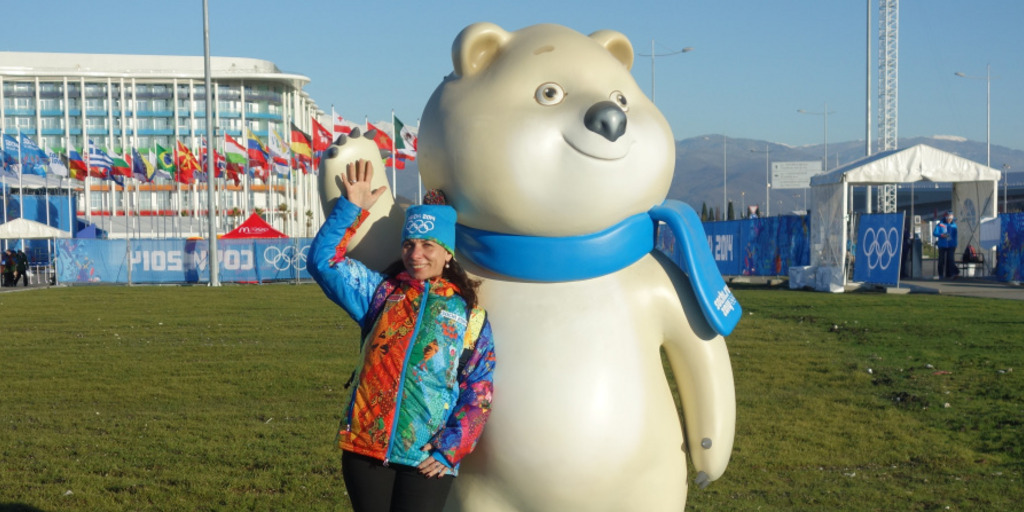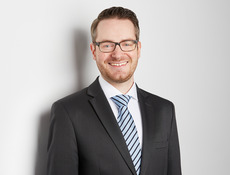When the 2014 Winter Olympics begin tonight in Sochi, not only will it be a dream come true for the 2,500 athletes. Larissa Markus, former participant in the Bertelsmann Stiftung's Leadership Program, will be realizing her own dream by serving as a volunteer for the games. What she has experienced so far are proud, hospitable hosts and a buoyant atmosphere untroubled by the controversies of the past few months.
As children, many people dream of participating in the Olympics. That was undoubtedly the case for many of the 2,500 athletes who will be competing over the next two weeks at the 2014 Winter Games in Sochi, Russia. For Larissa Markus, being part of the Games is definitely a dream come true. "I always said I wanted to go to the Olympics one day," says Markus, who immigrated to Germany from her native Kazakhstan in 2001 and now lives in Caputh near Potsdam. As a child in the Soviet Union, she loved ice skating. She is not competing for a medal in Sochi, however, but serving as a volunteer for the German Olympic team instead.
Her job is to assist athletes and trainers in the Olympic Village from now until February 26. If someone loses the key to their room, for example, she's there to help, or if they need to know how to get from where they are staying to their training site. "I think I can make myself useful," she says modestly. She's also looking forward to meeting new people and discovering more of the world as she carries out her duties.
Promoting understanding among the world's cultures – a key element of the Olympic philosophy – is not only something she cares about, it's also part of what she does professionally. Employed by the state of Brandenburg's Youth Sports Association, she is responsible for helping immigrants, especially girls and women, get involved in local sports clubs. In 2010 she was awarded the Equal Opportunity Prize of the German Olympic Sports Association for a project she organized that makes it possible for women who have immigrated to Germany help other female immigrants take up inline skating. In 2010 and 2011 she participated in the Bertelsmann Stiftung's Leadership Program "Helping Integration's Bridge-Builders." The goal of the program, which ended last year, was to promote civic engagement among immigrants and encourage them to get involved in issues relating to social integration in Germany.
In Sochi, Markus has not had to apply the things she learned in the program – promoting mutual understanding between cultures, for example – since her Russian hosts have been very welcoming of both her and her German colleagues. The critical reports that appeared in the German media and elsewhere documenting corruption, human rights violations and exploding construction costs have not been an issue, she says; neither has German President Joachim Gauck's decision not to attend the Games. "When people meet us, it's always a very friendly greeting of, 'Oh, you're from Germany!'" Markus explains. "Germany has a very good reputation in Russia. German orderliness and punctuality are qualities recognized around the world."
The heightened security measures implemented in the Olympic city because of terrorist threats are also not an issue. "There might be a few more security checks than the ones I experienced two years ago when I went to the Summer Games in London, but there aren't that many and they're not all that inconvenient," she says. "It makes you feel safe instead." The only real limitations are the ones the volunteers must observe when dealing with the athletes. "We're not allowed to speak to them directly, take pictures or ask for autographs," Markus explains. "They're supposed to feel right at home."
Markus feels she's back at home whenever she goes to breakfast, which the unpaid helpers receive free of charge, since the cost of their meals and their accommodation in a nearby hotel are covered by the Olympic Organizing Committee. "They have things that I last had when I was in Kazakhstan," she explains with a laugh. "Milk porridge and bliny." What does take some getting used to, however, is the range of temperatures experienced at the Games. It's not unusual for the thermometer to climb to 15 degrees Celsius at this time of year in Sochi, located directly on the Black Sea and home to the Olympic Park. Up in the mountains where the skiing, snowboarding and sliding events are taking place, it's usually 20 degrees colder. That's where Markus is scheduled to start helping out in the first week of the Games, and she's well prepared for the change of climate. "They advised us beforehand to get flu shots, and I did," she explains.
The volunteers are well prepared for their Olympic adventure in other ways as well. After completing an application on the Winter Olympics website, Markus had to take an English test and had an interview on Skype, during which she was also asked to demonstrate her Russian language skills – hardly a challenge for someone originally from Kazakhstan. In addition, two orientation workshops of several days each were held in Germany, with representatives of the Russian Olympic Committee in attendance.
Markus and the other volunteers not only get the chance to spend time in the Olympic Village, they also have access to tickets to the various competitions. And last Tuesday she was able to attend the dress rehearsal for the opening ceremony in the Olympic Stadium. As she watched, something became clear. "Through the Games the Russians are showing how extremely proud they are of their country and of the things they've achieved here," she says. And even if things are still being hammered into place here and there, and construction sites in the Olympic Park are being transformed into flowerbeds overnight, she feels the organizers deserve nothing but praise. "In my opinion, they've done a good job," she says.
For her part, Markus is proud of the German athletes. While in Sochi she has already met speed skater Claudia Pechstein and biathlete Andrea Henkel, among others. "We're all hoping that the German team brings home lots of medals," she admits. "As volunteers maybe we'll make some small contribution to achieving that goal, maybe just one percent. But no matter what, we'll be giving 100 percent." (fwa)




